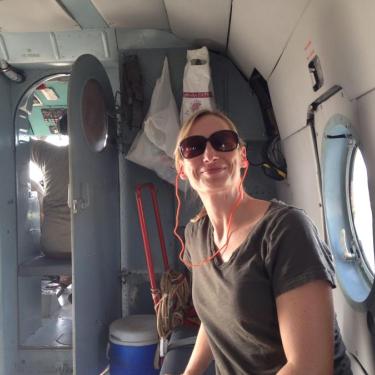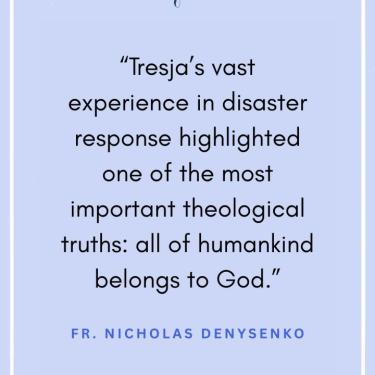A passion for humanitarian assistance was one of my first impressions of my late wife, Tresja (+19 August 2021). Our first extended conversation took place during coffee hour after Divine Liturgy in January 2001. I learned quickly that she had used her education in international relations at Gustavus Adolphus College and Northeastern University to discover opportunities for service. She volunteered in Niger for one year with the Peace Corps. Tresja told me about her recent experience living in Skopje, Macedonia, as an employee of Catholic Relief Services (CRS). I started to notice a pattern - she was passionate about international humanitarian assistance. When I asked her about her dream job, she said it was to work for the Red R, a British humanitarian assistance NGO that specialized in logistics. Ordinary people don’t get the crucial importance of good logistics, as I noted when I asked her what kinds of careers logisticians might pursue.
She was in between jobs during our courtship, working here and there in the greater Twin Cities metropolitan area. She paused her work to volunteer with Project Mexico for two weeks during the summer of 2001 while yours truly procured an engagement ring and waited anxiously for her return. Tresja worked for the Girl Scouts during our brief marital life in Minnesota, but that did not stop her from pursuing her training with the Red R, just a few months after we were married.
In conversation, Tresja would smile, tilt her head to the side, and wave her hands, making circle after circle with long, thin fingers, pointing out the kinds of problems that take place if a plane or helicopter drops off a pallet of food with no point of contact on the ground. Logisticians perfected processes and mechanisms that ensured aid - food, clothing, water, and medicine - made it into the hands of the people lacking basic human needs. Tresja explained clearly and animatedly why logisticians were important. The softening of human suffering and the restoration of broken communities depended on good logistics, at least in part.
Marriage is a life shared together, a rare opportunity to become intimately familiar with the parts of your spouse’s life you wouldn’t know otherwise. The nearly twenty years I spent with Tresja brought us over and over again to the constant urgency of serving humankind and alleviating people’s suffering.
Eventually, Tresja secured employment with the Center for Institutional Reform and Informal Sector (IRIS) at the University of Maryland, and soon afterwards, with the Office of Foreign Disaster Assistance (OFDA) of the United States Agency for International Development (USAID). Her work took her to Tanzania, Georgia, Liberia, Mozambique, Zimbabwe, the Democratic Republic of Congo, and Indonesia. I remember taking a call from her while she was in a car on a country road in Lesotho. (Yes, apparently I am among the few people who have heard of Lesotho).
It’s neither possible nor desirable to make our work and personal lives mutually exclusive in real-life instances of Severance. One’s employment and title does not define them, but we can express our personhood through our work, if we are so fortunate. Both Tresja and I brought our work home, and our professional lives contributed to the realities of ordinary domestic life.
Humanitarian aid work doesn’t produce wealth and is not glamorous. It requires long hours of meetings and planning, remotely and on site, and with multiple partners. Logisticians and disaster support specialists need to know how to work with government officials, military, firefighters, police, and dozens of non-governmental agencies. Sometimes, Tresja would take a phone call that interrupted dinner or took over a weekend. Natural and manmade disasters prompted her to depart for immediate and urgent international travel.
I spent chunks of my marriage corresponding with my wife on e-mail. Some couples leased their homes to tenants and moved overseas on short notice. The grueling nature of humanitarian assistance adds a layer of burden to marital and family life. I didn’t know that experience was preparing me for widowed life, without the benefit of digital communication.
Tresja’s faith motivated her to pursue work in humanitarian assistance. She was not the kind of person to publicly proclaim her faith or engage in long theological discussions at coffee hour after Divine Liturgy. She had no social media presence because it didn’t contribute to her personal contentment. Raised Methodist, Tresja became Orthodox in 2000 after spending much of her childhood and early adult life worshipping at St. Mary’s Orthodox Cathedral in Minneapolis, her parents’ home parish.
Theology was always practical for her and for us. She didn’t have any musical training, but loved the Church’s liturgy. She would often ask me to sing “Gladsome Light,” her favorite hymn, when we were at home. When I was asked to serve a Typica as a substitute for a traveling priest, she volunteered to sing the responses if there were no singers. I asked her why she would sing since she had no training, and she said that she wanted to help if there was no one else to do it. We had singers for that service, but the point was clear - she was ready to offer help always, in whatever way it was needed.

Tresja made a point of emphasizing volunteering during her free time. She was constantly on the lookout for opportunities to help prepare meals for the hungry, wherever we lived. I remember making several trays of roasted chicken with potatoes and delivering them to halfway houses in Maryland. The arrival of COVID put everyone’s faith to the test. In our case, the crisis brought us closer together. We prayed the Typica every weekend in our dining room, and sang the Holy Week and Pascha services together in 2020. The pandemic’s impact on the supply chain and employment drove thousands to food banks.
Tresja led our family in identifying opportunities to serve those in need, even though it seemed like a duplication of her day job. Her commitment to serving others was a rich point of intersection that helped to bind us as two very different people together. It was also a profound learning experience for me. Tresja’s vast experience in disaster response highlighted one of the most important theological truths: all of humankind belongs to God. I saw how she and her colleagues served everyone equally - there was no sense of a confessional preferential option.
Tresja pursued service to others relentlessly. She had met people face-to-face throughout the world who were suffering from war, famine, earthquakes, hurricanes, and geoeconomic instability. She understood the core meaning of the Eucharist on the basis of this experience. God’s kingdom is one of abundance, shared with and given to all, and it’s the responsibility of God’s body - the Church - to share this inexhaustible source of divine food to provide fundamental human needs with the peoples of all nations.
Tresja’s time in this world ended during her final mission of service. She was on the phone all day on August 14, 2021, with her supervisors, hastily organizing a response to the 7.2 magnitude earthquake that devastated Haiti. We were reluctant to let her go - it felt risky and dangerous, and I was an absolute wreck as I heard her running through the house, trying to pack everything she needed to catch a plane on August 15. She made it to Haiti, and I resigned myself to start yet another vigil of long, impatient waiting for her return home in September 2021. Her sudden death on August 19, 2021, in service to America and all humankind ruptured my vigil and transformed it into something entirely different.
Tresja had the personality type that we felt was most neglected in the culture of American Orthodoxy during our years of marriage - she was an introvert. She did not flaunt her faith and was interested in getting to know parishioners for who they were, without reducing them to their titles or status in the church. She certainly influenced me by reminding me that faith is internal and external, and lived in the entire world, not just in one’s parish. She pushed me further than anyone else I have ever met to see the image of God in every human person - old and young, pious and agnostic, lapsed and faithful. Tresja was a living manifestation of Jesus’ teaching to love one’s enemies, to lend and expect nothing in return (Lk. 6:32-36).
Many of Tresja’s coworkers shared stories with me of their encounters with her after her death. She spoke frequently and fondly of her love for the church, especially her excitement at sharing an important holiday with her family. Tresja was constantly regaling them with tales of magnificent Christmas and Paschal feasts and she shared recipes with her coworkers. While she worked tirelessly to support international humanitarian assistance, she blocked off time from work to be able to serve her local community and church. She shared enough of her personal faith to move one of her coworkers, a trained singer, to sing the Kontakion of the departed, “With the saints,” during a memorial in September 2021.
My reflections on the years that have elapsed since Tresja’s final mission will be recorded elsewhere. My feeble words here are a testimony to her life devoted to mission, to service, to the alleviation of suffering, to the lifting up of afflicted peoples throughout the world. What else is this but a life of authentic Christian leadership? Thank God for Tresja’s service and her witness.
Fr. Nicholas Denysenko is Emil and Elfriede Jochum Professor and Chair at Valparaiso University in Indiana, and assigned priest at Protection of the Virgin Mary Orthodox Church in Merrillville, Indiana (OCA).



